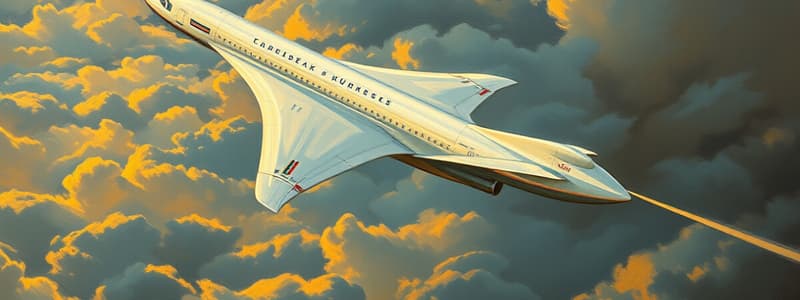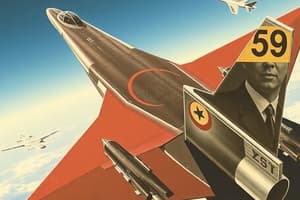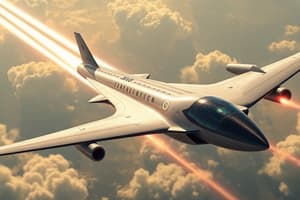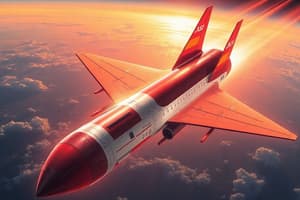Podcast
Questions and Answers
Which of the following was a supersonic transport (SST) that saw regular service?
Which of the following was a supersonic transport (SST) that saw regular service?
- Fokker 100
- Concorde (correct)
- Boeing 747
- Airbus A380
What was the last year of the Tu-144's passenger flight operations?
What was the last year of the Tu-144's passenger flight operations?
- 1999
- 2000
- 1978 (correct)
- 1983
What is a primary environmental concern associated with supersonic transport?
What is a primary environmental concern associated with supersonic transport?
- Sonic boom (correct)
- High fuel consumption
- Structural damage to airframes
- Frequent maintenance needs
Which company exclusively operated the Concorde?
Which company exclusively operated the Concorde?
What was the approximate operating cost of Concorde over its 28 years of service?
What was the approximate operating cost of Concorde over its 28 years of service?
What was one reported effect of the cessation of supersonic flights on climate change?
What was one reported effect of the cessation of supersonic flights on climate change?
Which was a notable financial issue faced by Concorde before privatization?
Which was a notable financial issue faced by Concorde before privatization?
Which of the following types of companies are attempting to reintroduce supersonic travel?
Which of the following types of companies are attempting to reintroduce supersonic travel?
What is one reason the FAA prohibits commercial airplanes from flying at supersonic speeds over the United States?
What is one reason the FAA prohibits commercial airplanes from flying at supersonic speeds over the United States?
Which company plans to bring back supersonic air travel by purchasing planes from Boom Supersonic?
Which company plans to bring back supersonic air travel by purchasing planes from Boom Supersonic?
What type of reactors are commonly used in nuclear-powered vessels like submarines?
What type of reactors are commonly used in nuclear-powered vessels like submarines?
What material was first hypothesized in 1903 as a suitable fuel for vehicles?
What material was first hypothesized in 1903 as a suitable fuel for vehicles?
Which vehicle was conceptualized in 1962 for the Seattle World's Fair as potentially nuclear-powered?
Which vehicle was conceptualized in 1962 for the Seattle World's Fair as potentially nuclear-powered?
What is a major obstacle noted in the 1937 analysis for using radioactive material in cars?
What is a major obstacle noted in the 1937 analysis for using radioactive material in cars?
Which country currently has nuclear-powered civilian surface ships?
Which country currently has nuclear-powered civilian surface ships?
What distinguishes 'living future' museums from 'living history' ones?
What distinguishes 'living future' museums from 'living history' ones?
What year did the Concorde stop flying?
What year did the Concorde stop flying?
What is a primary benefit airlines hope to achieve with supersonic flights?
What is a primary benefit airlines hope to achieve with supersonic flights?
Which design was created in 2009 to depict a new concept for a vehicle powered by nuclear material?
Which design was created in 2009 to depict a new concept for a vehicle powered by nuclear material?
Which propulsion method is primarily based on nuclear reactions?
Which propulsion method is primarily based on nuclear reactions?
What historic concept was explored in H.G. Wells' 1914 work related to propulsion?
What historic concept was explored in H.G. Wells' 1914 work related to propulsion?
Among nuclear-powered vessels, which type is most commonly utilized by military forces?
Among nuclear-powered vessels, which type is most commonly utilized by military forces?
What distinguishes nuclear thermal propulsion from traditional rocket engines?
What distinguishes nuclear thermal propulsion from traditional rocket engines?
What primary challenge was noted in the 1937 analysis regarding the use of radium in vehicles?
What primary challenge was noted in the 1937 analysis regarding the use of radium in vehicles?
What notable event marked the final operational activities of Concorde?
What notable event marked the final operational activities of Concorde?
Which two factors are the primary environmental concerns associated with supersonic transport?
Which two factors are the primary environmental concerns associated with supersonic transport?
What percentage of Concorde's profits were intended to return to the government from the subsidized purchases?
What percentage of Concorde's profits were intended to return to the government from the subsidized purchases?
How much did Concorde reportedly earn in revenues over its 28 years of operation?
How much did Concorde reportedly earn in revenues over its 28 years of operation?
Which aircraft is considered the most famous example of a supersonic transport?
Which aircraft is considered the most famous example of a supersonic transport?
What was the approximate amount of operating costs for Concorde during its service?
What was the approximate amount of operating costs for Concorde during its service?
What was revealed regarding Concorde's profitability after its commercial flights ceased?
What was revealed regarding Concorde's profitability after its commercial flights ceased?
What did the cessation of supersonic flights impact according to some evidence?
What did the cessation of supersonic flights impact according to some evidence?
What was a significant financial outcome for British Airways regarding Concorde after its privatization?
What was a significant financial outcome for British Airways regarding Concorde after its privatization?
How did the cessation of Concorde flights impact environmental factors according to some evidence?
How did the cessation of Concorde flights impact environmental factors according to some evidence?
What were the total revenues generated by Concorde during its operational lifespan?
What were the total revenues generated by Concorde during its operational lifespan?
What was one key reason for the lack of profitability from Concorde's initial subsidized purchases?
What was one key reason for the lack of profitability from Concorde's initial subsidized purchases?
Which feature of supersonic transport was particularly controversial due to its environmental impact?
Which feature of supersonic transport was particularly controversial due to its environmental impact?
What significant operational milestone was reached by the Tu-144 in June 1978?
What significant operational milestone was reached by the Tu-144 in June 1978?
What was the approximate operating cost of Concorde over its nearly 28 years of service?
What was the approximate operating cost of Concorde over its nearly 28 years of service?
Which aspect of the Concorde's operational history was disclosed following its cessation of flights?
Which aspect of the Concorde's operational history was disclosed following its cessation of flights?
What was one of the key reasons for the FAA's prohibition of commercial airplanes flying at supersonic speeds over the United States?
What was one of the key reasons for the FAA's prohibition of commercial airplanes flying at supersonic speeds over the United States?
Which type of nuclear reactor is most commonly utilized in military submarines and aircraft carriers?
Which type of nuclear reactor is most commonly utilized in military submarines and aircraft carriers?
Which material was first proposed in 1903 as a potential fuel source for vehicles?
Which material was first proposed in 1903 as a potential fuel source for vehicles?
What significant challenge was indicated in the 1937 analysis regarding the concept of cars powered by nuclear material?
What significant challenge was indicated in the 1937 analysis regarding the concept of cars powered by nuclear material?
What primary propulsion method uses nuclear reactions as its power source?
What primary propulsion method uses nuclear reactions as its power source?
Which country is known to have nuclear-powered civilian surface ships?
Which country is known to have nuclear-powered civilian surface ships?
In H.G. Wells' 1914 fiction work, what concept related to propulsion was explored?
In H.G. Wells' 1914 fiction work, what concept related to propulsion was explored?
What unique concept was presented by Loren Kulesus in 2009 for a vehicle powered by nuclear material?
What unique concept was presented by Loren Kulesus in 2009 for a vehicle powered by nuclear material?
Flashcards are hidden until you start studying
Study Notes
Supersonic Travel
- Supersonic transport (SST) refers to civilian aircraft capable of flying faster than the speed of sound.
- The only SSTs that have operated regularly in commercial service are Concorde and Tupolev Tu-144.
- The Tu-144's last passenger flight was in June 1978; it was retired in 1999 after NASA's experiments.
- Concorde ceased its commercial flights in October 2003, with a final ferry flight occurring on November 26, 2003.
- Following Concorde's retirement, no SSTs remain in commercial operation, prompting various companies to propose a new generation of supersonic business jets.
- Concorde was sold exclusively to British Airways and Air France, with government subsidies intended to return 80% of profits, although profits were minimal during its operation.
- After privatization, measures to cut costs and increase ticket prices led to eventual profitability; total operating costs were approximately £1 billion against revenues of £1.75 billion.
- Major environmental concerns associated with SSTs include sound pollution from sonic booms and potential ozone layer damage from engine exhaust.
- Evidence suggests that the cessation of supersonic flights has contributed to slowing climate change, as stratospheric water vapor levels decreased in the 2000s compared to the 1980s and 1990s.
- The FAA prohibits commercial aircraft from exceeding supersonic speeds over U.S. land due to adverse effects of sonic booms on people and wildlife.
- United Airlines plans to revive supersonic air travel by purchasing planes from Boom Supersonic, potentially restoring ultrafast commercial flights.
Nuclear Propulsion
- Nuclear propulsion encompasses various methods that use nuclear reactions as a primary power source for propulsion systems.
- The concept originated in the early 20th century; radium was proposed as a fuel for vehicles in 1903, later popularized by H.G. Wells in 1914.
- Nuclear reactors, particularly uranium-fueled pressurized water reactors, are widely used for military submarines and aircraft carriers due to their long operational periods without refueling.
- Applications of nuclear propulsion extend to space exploration with nuclear thermal engines and electric propulsion, which could outperform traditional rocket engines.
- Russia remains the only country to operate nuclear-powered civilian surface ships, primarily icebreakers.
- The notion of using radioactive materials for car propulsion emerged as early as 1903, but analysis in 1937 indicated the need for significant radiation shielding.
- Ford attempted to innovate with the Ford Seattle-ite XXI, a nuclear-powered concept car unveiled for the 1962 Seattle World's Fair, but this idea never materialized.
- In 2009, concept art for a car powered by thorium was created to commemorate General Motors' centenary of Cadillac.
Supersonic Travel
- Supersonic transport (SST) refers to civilian aircraft capable of flying faster than the speed of sound.
- The only SSTs that have operated regularly in commercial service are Concorde and Tupolev Tu-144.
- The Tu-144's last passenger flight was in June 1978; it was retired in 1999 after NASA's experiments.
- Concorde ceased its commercial flights in October 2003, with a final ferry flight occurring on November 26, 2003.
- Following Concorde's retirement, no SSTs remain in commercial operation, prompting various companies to propose a new generation of supersonic business jets.
- Concorde was sold exclusively to British Airways and Air France, with government subsidies intended to return 80% of profits, although profits were minimal during its operation.
- After privatization, measures to cut costs and increase ticket prices led to eventual profitability; total operating costs were approximately £1 billion against revenues of £1.75 billion.
- Major environmental concerns associated with SSTs include sound pollution from sonic booms and potential ozone layer damage from engine exhaust.
- Evidence suggests that the cessation of supersonic flights has contributed to slowing climate change, as stratospheric water vapor levels decreased in the 2000s compared to the 1980s and 1990s.
- The FAA prohibits commercial aircraft from exceeding supersonic speeds over U.S. land due to adverse effects of sonic booms on people and wildlife.
- United Airlines plans to revive supersonic air travel by purchasing planes from Boom Supersonic, potentially restoring ultrafast commercial flights.
Nuclear Propulsion
- Nuclear propulsion encompasses various methods that use nuclear reactions as a primary power source for propulsion systems.
- The concept originated in the early 20th century; radium was proposed as a fuel for vehicles in 1903, later popularized by H.G. Wells in 1914.
- Nuclear reactors, particularly uranium-fueled pressurized water reactors, are widely used for military submarines and aircraft carriers due to their long operational periods without refueling.
- Applications of nuclear propulsion extend to space exploration with nuclear thermal engines and electric propulsion, which could outperform traditional rocket engines.
- Russia remains the only country to operate nuclear-powered civilian surface ships, primarily icebreakers.
- The notion of using radioactive materials for car propulsion emerged as early as 1903, but analysis in 1937 indicated the need for significant radiation shielding.
- Ford attempted to innovate with the Ford Seattle-ite XXI, a nuclear-powered concept car unveiled for the 1962 Seattle World's Fair, but this idea never materialized.
- In 2009, concept art for a car powered by thorium was created to commemorate General Motors' centenary of Cadillac.
Supersonic Travel
- Supersonic transport (SST) refers to civilian aircraft capable of flying faster than the speed of sound.
- The only SSTs that have operated regularly in commercial service are Concorde and Tupolev Tu-144.
- The Tu-144's last passenger flight was in June 1978; it was retired in 1999 after NASA's experiments.
- Concorde ceased its commercial flights in October 2003, with a final ferry flight occurring on November 26, 2003.
- Following Concorde's retirement, no SSTs remain in commercial operation, prompting various companies to propose a new generation of supersonic business jets.
- Concorde was sold exclusively to British Airways and Air France, with government subsidies intended to return 80% of profits, although profits were minimal during its operation.
- After privatization, measures to cut costs and increase ticket prices led to eventual profitability; total operating costs were approximately £1 billion against revenues of £1.75 billion.
- Major environmental concerns associated with SSTs include sound pollution from sonic booms and potential ozone layer damage from engine exhaust.
- Evidence suggests that the cessation of supersonic flights has contributed to slowing climate change, as stratospheric water vapor levels decreased in the 2000s compared to the 1980s and 1990s.
- The FAA prohibits commercial aircraft from exceeding supersonic speeds over U.S. land due to adverse effects of sonic booms on people and wildlife.
- United Airlines plans to revive supersonic air travel by purchasing planes from Boom Supersonic, potentially restoring ultrafast commercial flights.
Nuclear Propulsion
- Nuclear propulsion encompasses various methods that use nuclear reactions as a primary power source for propulsion systems.
- The concept originated in the early 20th century; radium was proposed as a fuel for vehicles in 1903, later popularized by H.G. Wells in 1914.
- Nuclear reactors, particularly uranium-fueled pressurized water reactors, are widely used for military submarines and aircraft carriers due to their long operational periods without refueling.
- Applications of nuclear propulsion extend to space exploration with nuclear thermal engines and electric propulsion, which could outperform traditional rocket engines.
- Russia remains the only country to operate nuclear-powered civilian surface ships, primarily icebreakers.
- The notion of using radioactive materials for car propulsion emerged as early as 1903, but analysis in 1937 indicated the need for significant radiation shielding.
- Ford attempted to innovate with the Ford Seattle-ite XXI, a nuclear-powered concept car unveiled for the 1962 Seattle World's Fair, but this idea never materialized.
- In 2009, concept art for a car powered by thorium was created to commemorate General Motors' centenary of Cadillac.
Studying That Suits You
Use AI to generate personalized quizzes and flashcards to suit your learning preferences.





